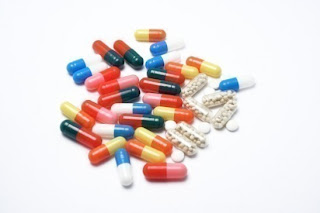There is no magic bullet, pill or potion for weight loss though slimming potions of some sort or another have been around for a very long time. The earliest records are nearly 2000 years old and describe mixtures of purgatives and laxatives. Similar types of preparation remained the mainstay of weight reduction until the beginning of the last century when hormones such as thyroxin (to fasten metabolism), followed by amphetamines (to suppress appetite) and their derivatives were introduced. Although their dangers were recognized early on, for several decades they continued to be used and amphetamines were only banned as diet pills in 1979.
 Today, slimming pills are divided into those which suppress appetite i.e. trick the body into thinking it is full or reduce absorption of certain nutrients. Some also speed up metabolism.
Today, slimming pills are divided into those which suppress appetite i.e. trick the body into thinking it is full or reduce absorption of certain nutrients. Some also speed up metabolism. Drugs which suppress appetite act on the brain or block certain receptors or hormones, decreasing the need for food. Some also delay gastric emptying, thus prolonging the feeling of fullness. They are serious drugs. Some similar to amphetamines can have stimulant effects and are potentially very dangerous. Any sort of diet pill should only be prescribed by and supervised by health care professionals experienced in their use. They should only be used on a temporary basis after all other life style measures have been explored and according to the defined guidelines and recommendations. Only Sibutramine (Brand names Meridia or Reductil) is recommended for use by the National Institute for Clinical Excellence (NICE). Some, such as Rimonabant (brand name Acomplia), are either not recommended or have been withdrawn because the benefits do not outweigh the side effects.
An example of a ‘drug’ which tricks the body into thinking it is full is Appesat (known as the Seaweed diet pill). There are a number of other preparations on the market working on a similar basis. Appesat, made from sea weed expands in the stomach thus reducing the volume available for food. This means that one will feel full on less food. However, the effect will last only as long as one continues taking the pill with every meal, it does not prevent snacking or comfort eating and works only as long as the pill is taken and if efforts have been made to also lose weight naturally. Further, it does not solve the long term problem of habitually overeating and or of eating ‘wrong’ foods. It is also expensive.
An example of a drug that reduces absorption of certain foods is Orlistat, available on prescription (or Alli, its equivalent at a smaller dose and available to the general public). Orlistat reduces the absorption of fats. This means that on a ‘normal’ diet, most of the calories that are taken in will be from carbohydrates. However, since most of the dietary calorie intake is from carbohydrates in any case, Orlistat works only if there is also dietary carbohydrate restriction. According to NICE, Orlistat should be prescribed only in conjunction with lifestyle changes (dieting and exercise) and continued for more than 3 months only if there has been a documented 5% decrease in body weight. With Alli, since it is weaker, that is even more important. Further, Orlistat and Alli have also side effects ranging from the inconvenience of having fatty stools and fatty diarrhoea to malabsorption of fat soluble vitamins. The latter can in the long term lead to osteoporosis, undue bleeding and may other problems. Orlistat and Alli and also very expensive. Also, as with all other diet pills, unless one changes ones dieting habits during the treatment and continues to so do thereafter, the weight will simply come back
In summary, we are what we eat and what we do. If the calorie intake matches the output, we neither lose nor gain weight. If the intake is higher we will put on weight. Exercise will increase the calories output, thus combining a sensible, long term dietary regime with exercise will help in both losing weight and then maintaining it. Remember, there is no magic bullet, pill or potion to counteract excessive eating, eating calorific food, comfort food, snacking and a sedentary life style. Any gains through drugs that suppress appetite, increase metabolism, ‘trick’ the body or reduce absorption are an expensive and potentially dangerous short term option which should be reserved only for those where there is no other option and where it is medically justified.
Dr Yvette Lolin, Clinical Advisor
FRCPAth, PhD
Consultant in Metabolic Medicine and Chemical Pathology




0 comments:
Post a Comment